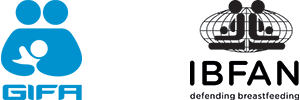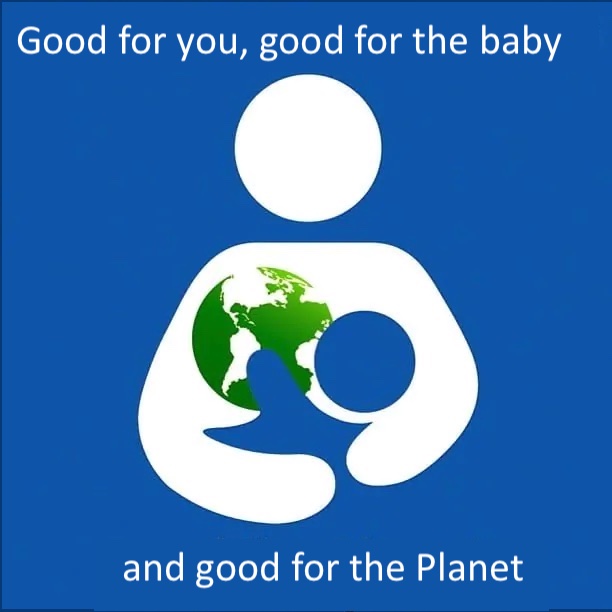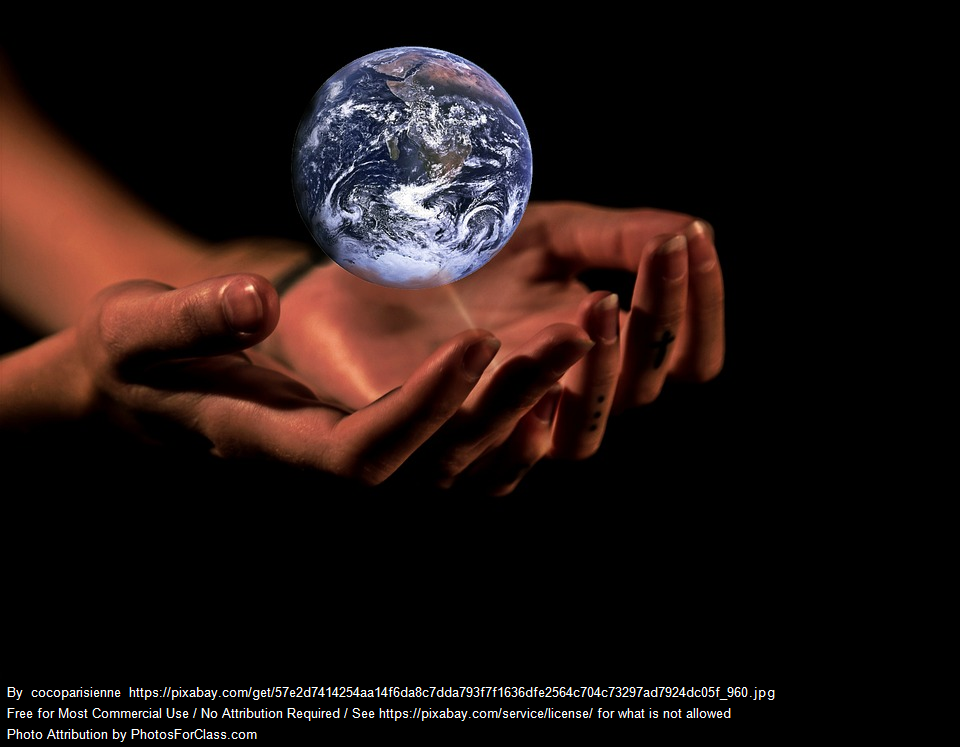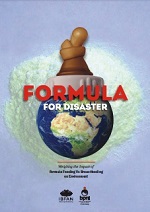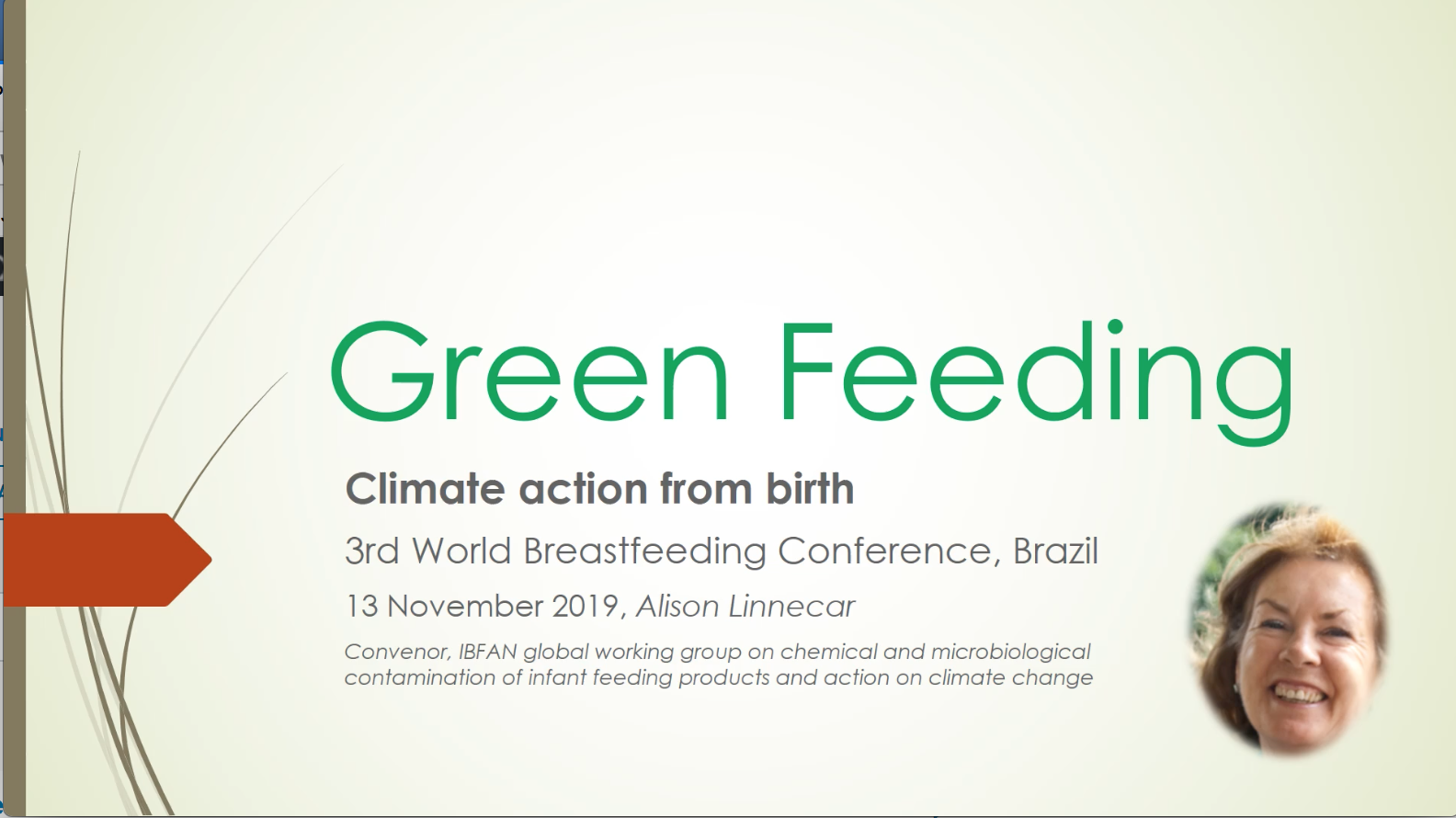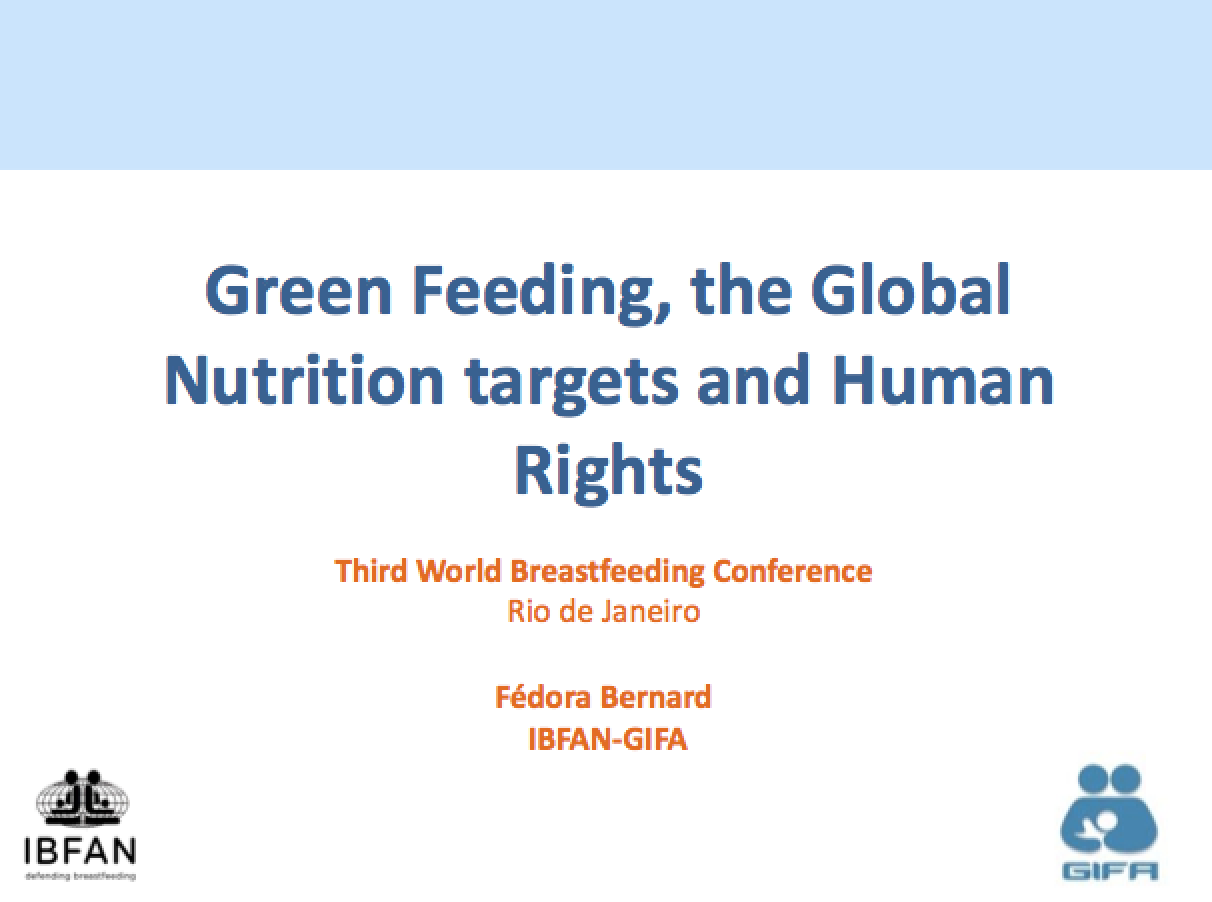2024/03/05
Greenfeeding (Ecofeeding) means healthy local and sustainable Food. Greenfeeding starts with Breastfeeding which has a positive impact on our climate and environment.
The core message of our advocacy as a global NGO is ‘In every journey it is the first step that counts. Greenfeeding from birth is the very first step in the right direction, to protect the health of populations and the planet.’
NEWS 2023
1- Updated Greenfeeding document 2023
Greenfeeding Worldwide. New updated PDF in English, 27 pages with active table of content and list of references with hyperlinks (Dec 8, 2023) https://www.gifa.org/wp-content/uploads/2024/03/2023-Green-Feeding-Europe-and-Worldwide-2023-FINAL-R.pdf
2- Greenfeeding in “World Nutrition”
Greenfeeding – or Ecofeeding – stands for eating healthy, sustainable, and ecologically friendly foods, as opposed to ultra-processed foods. As food production has an important share in greenhouse gases and climate change, greenfeeding in « World Nutrition » needs our full attention.In fact, breastfeeding is gaining momentum as greenfeeding, with its numerous advantages compared to formula feeding. GIFA authored a commentary in the « World Nutrition » Journal’s June edition about the considerable negative impact of formula on the environment. World Nutrition, commentary Boutry-Stadelmann & Linnecar 2023 https://worldnutritionjournal.org/index.php/wn/article/view/957/764 See also our Newspost
3- Launch of the Green Feeding Tool – June 5th, 2023
Launch of the Greenfeeding Tool (GFT) by Australian National University (ANU), Julie Smith and collegues, to measure the global ecological impact of commercial milk formula (CMF). The downloadable tool calculates the carbon and water footprints of countries’ different infant feeding practices. It shows the environmental gains from policy scenarios that enable women and infants to exclusively breastfeed for the first six months. The Launch Event Recording https://nceph.anu.edu.au/research/projects/green-feeding-tool GIFA made a short presentation about the historical background of the idea that breastfeeding is ecological. List of documents, see links under Background – historical overview about ecological footprint of formula

What is the Greenfeeding campaign?
Greenfeeding is an advocacy campaign prepared by IBFAN, GIFA and Canadian partners. It is aimed at decision-makers, parents, young people and care-givers. The objective is to raise awareness of the need to take action from birth to safeguard the health of humans and our environment:
- Greenfeeding recognises breastfeeding as a sustainable and valuable natural resource that has no negative impact on our environment: no scarce resources are used, no pollution is caused by transport, no garbage is produced by packaging, and expenditure on health costs to treat disease is reduced.
- Breastfeeding is under serious threat from commercial practices and urgently needs to be protected, promoted and supported.
- Greenfeeding includes the introduction, after six months of age, of complementary foods that are safe and nutritious, and produced using local products and sustainable agriculture.
Breastfeeding is unprocessed local food
Breastfeeding contributes to the prevention of global warming, protects biodiversity and conserves natural resources. Greenfeeding includes community support for exclusive breastfeeding for 6 months and the addition of appropriate complementary foods for older babies. In contrast to ultraprocessed foods (UPF) like formula and artificial baby milks, breastmilk is unprocessed, unpacked, healthy local food.
The Importance of protecting breastfeeding
Community support can be undermined by the marketing and promotion of ultra-processed foods. Hence the importance of the International Code that protects consumers and families.
What about Baby foods?
After 6 months, baby eats first foods. Families should be allowed to make feeding decisions free from commercial pressures: for babies, toddlers and young children. Sustained breastfeeding needs support for as long as the family wants. Breastmilk continues to be precious sources of nutrition, especially when complemented by safe and nutritious family foods, locally produced using sustainable agriculture. Home-prepared family foods are minimally processed so offer value for money. Sustainable local agriculture provides foods that are biodiverse, reliable, and culturally appropriate. Community support can be undermined by marketing and promotion of ultra-processed foods. This is the reason the International Code of Marketing is crucial.
What about UPFs?
Ultra-processed foods (UPFs) are a risk for our health and have major impacts on the environment. Giving formula in comparison to breastfeeding is giving UPFs to our children.
- Check our News post. Consumption of ultra-processed food products (UPFs) is associated with excess weight gain, serving as a precursor to non-communicable diseases NCDs.
- Moradi et al (2021) Ultra-processed food consumption and adult obesity risk: a systematic review and dose-response meta-analysis https://www.tandfonline.com/doi/abs/10.1080/10408398.2021.1946005 This article calls for a policy that halts rising trend of consumption and restricts marketing as well as warning labels on UPFs.
- Unseen dangers of UPFs (20 pages)
- Chris van Tulleken (2023) Ultra-processed people – Why do we all eat stuff that isn’t food… and why can’t we stop?
Key Documents on Greenfeeding issues
- 2023 Greenfeeding document (updated May 19, 2023)
- Green Feeding Trailer, in English, 2 pages (Nov 18, 2019) has to be updated
- Green Feeding Key messages 2019 in English, 2 pages (Dec 2, 2019) has to be updated
- Green Feeding Canada in English, 10 pages (June 20, 2019) has to be updated
- Why invest? – The environmental costs of not breastfeeding (Rollins et al, Lancet 2016)
- Extinction Rebellion flyer on Breastfeeding – Green Feeding (Dec 2, 2019)
- Formula For Disaster (updated 2015). Weighing the Impact of Formula Feeding vs Breastfeeding on Environment.
- What’s in Breastmilk and Formula (poster) to give an idea how “artificial” formula is
Background – historical overview about the ecological footprint of formula
For more references, see the list in the Greenfeeding document 2023
2023 May, Updated Greenfeeding document by IBFAN-GIFA-WBTi
2023 March, World Breastfeeding Conference (WBC4), Alison Linnecar presents Green Feeding and biodiversity in Cairo (Egypte). See under “Events” further down
2022, Mother’s milk tool: Valuing breastfeeding, Dr. Julie Smith and team https://nceph.anu.edu.au/research/projects/valuing-breastfeeding-through-mothers-milk-tool “Money is the language of policymakers. Counting human milk production in food and economic statistics will assist in better policy decision-making and investments in women’s unpaid care work. The Mothers’ Milk Tool quantifies the volume of breastmilk and value of breastfeeding at national and global levels, as well as how much is lost if country environments and policies, or healthcare, work and community settings do not enable women’s and children’s rights to breastfeeding.” Article about the tool in FRONTIERS
2022, Andresen CA et al, Environmental Impact of Feeding with Infant Formula in Comparison with Breastfeeding
2021, Dadhich JP, Smith J, Iellamo A, Suleiman A. Climate Change and Infant Nutrition: Estimates of Greenhouse Gas Emissions From Milk Formula Sold in Selected Asia Pacific Countries The first peer reviewed article about the ecological impact of formula (CMF commercial milk formula).
2021, Long A et al Infant feeding and the energy transition: A comparison between decarbonising breastmilk substitutes with renewable gas and achieving the global nutrition target for breastfeeding
2020, World Breastfeeding Week (WBW) was dedicated to Support Breastfeeding for a healthier Planet See also World Breastfeeding Week and WABA Action Folder 2020 here
2020 Cadwell K et al, Powdered Baby Formula Sold in North America: Assessing the Environmental Impact
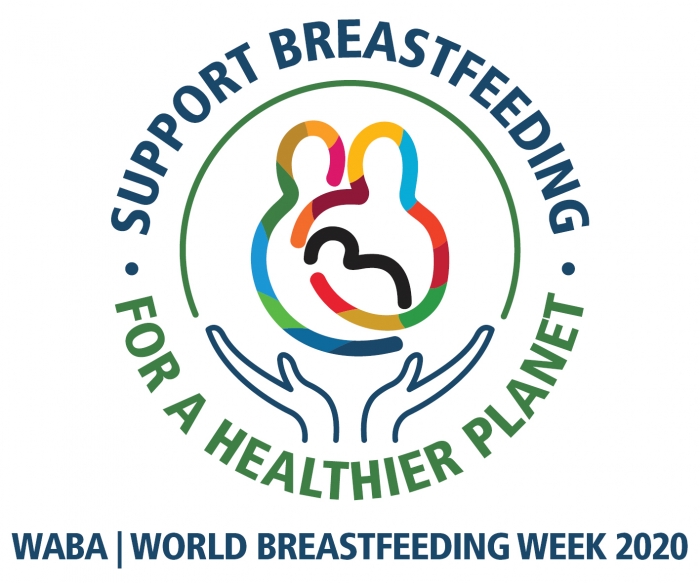
2019 Nov, World Breastfeeding Conference (WBC3), Alison Linnecar presents Greenfeeding, Breastfeeding, climate action from birth, in Rio de Janeiro. See other presentations further down on this page
2019, Dr Julie Smith, A commentary on the carbon footprint of milk formula. The 2015 IBFAN report estimated the GHG emissions from manufacturing 1 kg of infant or toddler milk to be around 4 kg of CO2 eq.; this was a partial estimate of the product’s lifecycle, and excluded carbon footprints at retail and household use stages. We have to take into account all externalities.
2019, Joffe N, Webster F, Shenker N. BMJ Support for breastfeeding is an environmental imperative (2 October 2019)
2018 Casserla C. (2018). No One is Talking about the Environmental Impacts of the Baby Formula Industry. Published by Science as Fact, in editorial section of Science Alert. https://www.sciencealert.com/no-one-is-talking-about-the-environmental-impacts-of-the-baby- formula-industry – IBFAN does, since 30 years!
2018 New Zealand Priority Actions for Climate Health 2018: Promote breast-feeding and plant-based diets to support both human and planetary health.
2015, IBFAN-GIFA published the brochure on Climate Change and Health advocating breastfeeding as an eco-bio-logical way to protect both our health and the health of our planet, especially in times of crisis. Downloads available also in French , Spanish , Russian , Italian on IBFAN website
- Breastfeeding is the first step in protecting human health in the short and long term.
- Breastfeeding is the first step towards protecting the environment and preserving the planet and resources
- Breastfeeding helps to save lives and relieve suffering in crisis and shortage situations that are arising as a result of climate change.
In 2015 Dadhich J et al. published Carbon Footprint due to Milk Formula. A study from selected countries of the Asia Pacific region.
2014, IBFAN published ‘Formula For Disaster’. Weighing the Impact of Formula Feeding Vs Breastfeeding on Environment’. This report was updated in 2015 and is available in English, Italian and French as Alimentation artificielle – désastre écologique, it compares in detail the ecological impact of breastfeeding on the one hand, and industrial infant feeding on the other. The comparison between the two methods of feeding relates to the use of the planet’s resources (energy, metals, plastics, fuels, water and wood). While artificial feeding depletes the planet’s resources and has a heavy carbon and water footprint, breastfeeding saves energy and water and promotes not only improved maternal and child health, but also the better health of the planet.
2012, at the UN Conference on Sustainable Development (Rio+20), IBFAN-GIFA prepared a poster on the theme of “The Earth is our Mother” in collaboration with WABA (World Alliance for Breastfeeding Action). Download poster and text : English-Spanish-Portuguese , French
1997, WABA declared the theme for World Breastfeedin Week (WBW) as “Breastfeeding – Nature’s Way” and underpined the ecological benefits of breastfeeding. In 2020, this was even more relevant and the theme was “Support Breastfeeding for a healthier planet”.
1992, UN Earth Summit in Rio de Janeiro: IBFAN “Ecological Impact of Bottle-feeding”
1989, Alison Linnecar published a paper that shows the importance of breastfeeding for ecology and alerts about the environmental impact of infant formula and the risk of contamination by bacteria, by aluminium lead etc. Breastfeedjing-Ecology with love
Events that led to public attention
WBC4 World Breastfeeding Conference 2023
IBFAN’s Call to Action from Cairo WBC 2023. As a renewable, resilient practice that provides food, care and immune support and prevents malnutrition in all its forms, breastfeeding also contributes to the early prevention of violence and the development of more environmentally friendly attitudes, behaviors and consumption.- See also Alison Linnecar’s presentation on Breastfeeding and biodiversity
COP 27 – Conference on Climate Change 2022
As world leaders meet in Sharm El-Sheikh, Egypt for the 27th United Nations Climate Change Conference (Cop 27), IBFAN is calling for restrictions on the global production and trade of ultra-processed (UPFs) plastic-wrapped and additive-laden products. While many nutrition campaigns have focused on excess sugar, salt and fat, less attention has been paid to the industrial food processing that extends product life for global trade, denatures food ingredients and has had a disastrous impact on human health and the environment. The latest analysis shows that UPF consumption is a significant cause of premature death in Brazil….continue reading this article on IBFAN UK/Baby Milk Action website or download the PDF file to share
Existe também uma versão portuguesa da declaração do IBFAN da COP27
Greenfeeding at 3rd World Breastfeeding Conference (WBC) 2019
Slides and film from 3rd World Breastfeeding Conference (WBC) in Rio de Janeiro, Nov 2019
1) Dr JP Dadhich’s Presentation at WBC3 2019 (20 slides)
2) Alison Linnecar’s Presentation at WBC3 2019 (mp4)
3) Fedora Bernard’s Presentation at WBC3 2019 (17 slides)
Climate Change on UN Agenda 2019
Between May and September 2019, global warming has turned into global heating, and climate change has become a climate emergency. The United Nations has sounded the fire alarm and in September the 2019 UN Climate Summit calls for us all to “Commit to invest in climate action, public health and sustainable development.” The UN website lists examples of climate action, including food: https://www.un.org/en/actnow/ We need to inform and mobilise – and we need to start at the very beginning of our lives with Greenfeeding which means Breastfeeding and giving local complementary foods to our children.
Tools
Greenfeeding Tool 2023
Launch of the Greenfeeding Tool (GFT) on June 5 by Australian National University (ANU), Julie Smith and collegues, to measure the global ecological impact of commercial milk formula (CMF). The downloadable tool calculates the carbon and water footprints of countries’ different infant feeding practices. It shows the environmental gains from policy scenarios that enable women and infants to exclusively breastfeed for the first six months. Link to the Launch Recording https://nceph.anu.edu.au/research/projects/green-feeding-tool
Mothers’s milk tool 2022
Valuing breastfeeding, Dr. Julie Smith and team https://nceph.anu.edu.au/research/projects/valuing-breastfeeding-through-mothers-milk-tool “Money is the language of policymakers. Counting human milk production in food and economic statistics will assist in better policy decision-making and investments in women’s unpaid care work. The Mothers’ Milk Tool quantifies the volume of breastmilk and value of breastfeeding at national and global levels, as well as how much is lost if country environments and policies, or healthcare, work and community settings do not enable women’s and children’s rights to breastfeeding.” Article about the tool in FRONTIERS
Costs of not breastfeeding Tool 2022 (new version)
In August 2022, Alive & Thrive and Nutrition International released a new version of the Cost of Not Breastfeeding tool, updated with the latest data for more than 160 countries.
WBCi World Breastfeeding Cost initiative Tool
World Breastfeeding Cost initiative tool is a research and advocacy paper initiated by International Baby Food Action Network (IBFAN)- Asia as part of the World Breastfeeding Costing Initiative. It presents sobering facts and figures to showcase the price countries pay by not supporting the practice of optimal breastfeeding. This tool is available at www.bpni.org/wbci.html
2018 Method to estimate GHG emissions
Innovative method to estimate GHG emissions for Formula (BPNI/IBFAN India 2018) was a pioneer work. Today, see new Green Feeding Tool GFT which takes into account extended GHG emissions and also water footprint and other externalities.
For more information….
- IBFAN website section on Climate Action and environmental awareness.
- IBFAN statement on climate and health at the 136th session of the Executive Board of the World Health Organization, January 2015
- Formula for Disaster: UNICEF documentary (FULL VIDEO) https://www.youtube.com/watch?v=3PBtb-UDhEc
- Letter to Pope Francis (2015): Italian , Spanish , English
- IBFAN-GIFA document on climate change and health in French: Changement climatique et santé (2015)
- The Telegraph article https://www.telegraph.co.uk/science/2019/10/02/breastfeed-save-planet-scientists-say-study-exposes-infant-formula/
